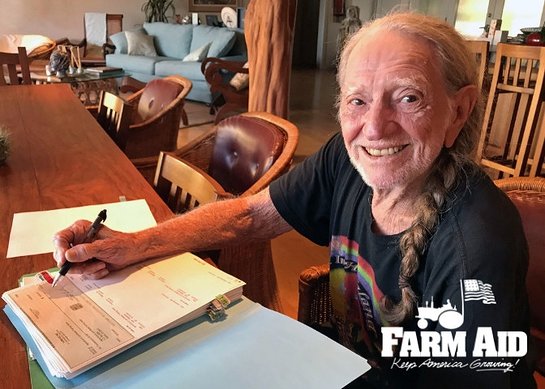In the midst of the worst farm crisis since the 1980s, Farm Aid announced today that it distributed more than half a million dollars in grant funding in 2018.

Farm Aid grants invest in organizations working to build resilient farmers, who are key to the creation of a thriving farm and food system.
In 2018, Farm Aid granted $695,679 to farmers and 78 family farm, rural service and urban agriculture organizations in 36 states and the District of Columbia. Emergency grants totaling $45,000 were made to farm families to cover essential household expenses. These $500 emergency grants are recommended on a case-by-case basis by Farm Aid’s farm advocates, who answer calls on the 1-800-FARM-AID hotline and connect farmers with helpful services, resources and opportunities specific to their individual needs.
“As farmers continue to face incredible threats to their survival, our grant decisions were guided by the need to first and foremost strengthen organizations that provide essential resources to keep family farmers on the land,” said Farm Aid President Willie Nelson. “We are so grateful for the hard work and commitment of folks across the country who fight for family farms.”
Other granting priorities include work that builds agricultural resiliency to combat the impacts of natural disasters and climate change and work addressing systemic inequities in the farm and food system, specifically for farmers of color.
“Thanks to generous supporters from across the country, today Farm Aid makes grants to grassroots groups and advocates doing the hard work to keep family farmers on the land,” said Executive Director Carolyn Mugar. “Farm Aid grants strengthen family farm agriculture, challenge corporate power in our food system, increase access to good food for all of us, and grow new farmers to steward our soil and water. These are critical activities that benefit us all.”
In New England, where Farm Aid held its annual music and food festival at XFINITY Theatre in Hartford, Connecticut, this past September, Farm Aid invested $100,000 in 18 programs that support family farmers to thrive, take action to change the farm and food system, and grow the Good Food Movement. Awardees include:
- Bridgeport Farmers Market Collaborative, Bridgeport, Connecticut, to sustain Bridgeport Farmers Markets and local farmers.
- CitySeed, Inc., New Haven, Connecticut, to support farm viability in Connecticut by building networks between Connecticut food businesses and farmers.
- Community Involved in Sustaining Agriculture, Inc., South Deerfield, Massachusetts, to engage the community to support local agriculture not just as consumers, but also as advocates for a resilient and diverse local food economy.
- Farm Fresh Rhode Island, Pawtucket, Rhode Island, to deepen community connections in low-to-moderate income areas in Rhode Island.
- Green Village Initiative, Bridgeport, Connecticut, to cultivate new farmers in Bridgeport through Youth Leadership Programming for young people and Urban Farmer Training Programming for adults.
- Hartford Food System, Hartford, Connecticut, to engage farmers in the development of a Connecticut food system plan through Farmer Listening Tours.
- Real Food Challenge, Cambridge, Massachusetts, to create a system-wide shift in the university foodservice industry that consistently invests in family farms and sustainable food enterprises.
- Red Tomato, Plainville, Massachusetts, to help midsized growers through marketing efforts promoting advanced integrated pest management and agroecological tree fruit production.
- Southeastern Massachusetts Agricultural Partnership, South Dartmouth, Massachusetts, to strengthen their technical assistance for farmers, and for local food promotion in the Southeastern Massachusetts community.
- Connecticut Farmland Trust, Hartford, Connecticut, to permanently protect farmland for agricultural use.
- KNOX, Inc., Hartford, Connecticut, for its incubator farm program that provides low-income beginning farmers with land, training and connections to scale up their production and launch their own family farming businesses.
- Land For Good, Keene, New Hampshire, to provide no- and low-cost coaching and advising to farm seekers, transitioning farm families and others who control farmland, and to support the New England Farmland Finder.
- Maine Organic Farmers and Gardeners Association, Unity, Maine, to provide family farmers with ongoing resources to start farming, transition to more sustainable practices, and continue farming.
- New Entry Sustainable Farming Project, Lowell, Massachusetts, to grow and scale its farmer training programs and to establish the Central Incubator Training Site as a centralized beginning farmer training hub.
- The Carrot Project, Boston, Massachusetts, to foster a sustainable and diverse food system by supporting ecologically- and financially-sustainable small and midsize farms and food processors with financing and financial literacy training.
- The Livestock Institute of Southern New England, Westport, Massachusetts, to revitalize and strengthen livestock farming in southern New England by creating a meat processing facility and educational opportunities for partner farmers.
- Northeast Organic Farming Association Interstate Council, Barre, Massachusetts, to bring together farmers, farm groups, environmental organizations, and other potential soil health proponents to advance soil health advocacy.
- Rural Vermont, Montpelier, Vermont, to lead the resurgence of community-scale agriculture through education, advocacy and organizing.
Earlier this year, Farm Aid granted $40,500 to assist farm and ranch families in the Carolinas who suffered devastation after Hurricane Florence. Farm Aid continues to work with partners in the region to assess the long-term needs of impacted farmers and ranchers. Grants of $19,179 provided scholarships to farmers to participate in leadership trainings, policy advocacy and other gatherings where farmers’ perspectives are essential.
Farm Aid’s grant-making is one aspect of its work to keep family farmers on the land, growing good food for all. In addition, other Farm Aid programs inspire an increased demand for family farm food; bring farmers, advocates and activists together for trainings and other opportunities; advocate for policies that serve farmers and consumers alike; and invite everyone to be part of building a thriving family farm system of agriculture.
For a complete listing of Farm Aid’s 2018 grant recipients, visit www.farmaid.org/2018grantees.
Farm Aid welcomes donations at www.farmaid.org/donate.





